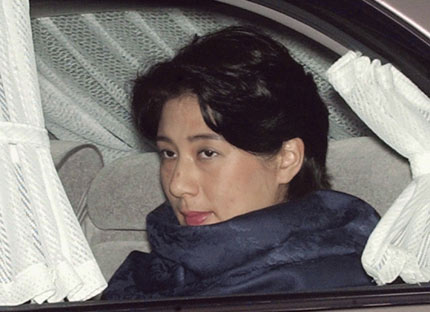
Japanese princess admits mental illness
By Colin Joyce
Tokyo

Crown Princess Masako of Japan, who disappeared from public view eight months ago, is suffering from a mental illness, the Imperial Household said on Friday in a stunning break with tradition.
It said she was suffering from "adjustment disorder".
Two months ago Crown Prince Naruhito shocked the country by discussing the toll that royal life had taken on his 40-year-old former diplomat wife. The Imperial Household Agency and Hideki Hayashida, Grand Master of the Crown Prince's Household, have revealed more details.
Mr Hayashida said the princess's condition was marked by sleeplessness, anxiety and physical symptoms resulting from stress. Her problems had been described as "mental and physical weariness".
Mr Hayashida all but confirmed rumours the princess has been depressed by referring to "depressive feelings" that have made it hard for her to carry out duties. She is receiving psychotherapy and prescription drugs.
"The main cause is . . . stress stemming from . . . her special status as crown princess, problems related to her pregnancy and miscarriage, and her busy . . . life in which it is hard to draw a line between public and private matters," Mr Hayashida said. "In general it takes a fair amount of time to recover mental health. So we have asked that she put priority on private activities . . . rather than specifically consider a return to official duties."
Masako, who was educated at Harvard and Oxford, and is fluent in several languages, has hinted at the stress of royal life since she was married in 1993. Under intense public pressure to produce an heir, she had a miscarriage before giving birth to Princess Aiko in December 2001.
Crown Prince Naruhito has suggested that a lack of overseas trips had also played a part in her becoming ill. Masako has been abroad five times since the wedding.
Mr Hayashida all but confirmed rumours that the princess has been depressed.
The decision to make public the diagnosis was reportedly made by the princess herself and her husband, with the approval of Emperor Akihito and Empress Michiko.
Though courtiers remain deeply conservative, imperial family members have encouraged a relatively open approach, as seen when the emperor revealed in 2002 that he was suffering from prostate cancer.
Mr Hayashida said a team of top doctors had been assembled, the princess was receiving light medication and was expected to recover gradually.
In Japan, adjustment disorder is commonly associated with children who grow up abroad but experience shock at the rigidity of Japanese culture when they return home. The princess experienced a culture shock when she gave up her career as a diplomat to join the imperial household.
- Telegraph
http://www.theage.com.au/articles/2004/07/31/1091080487941.html